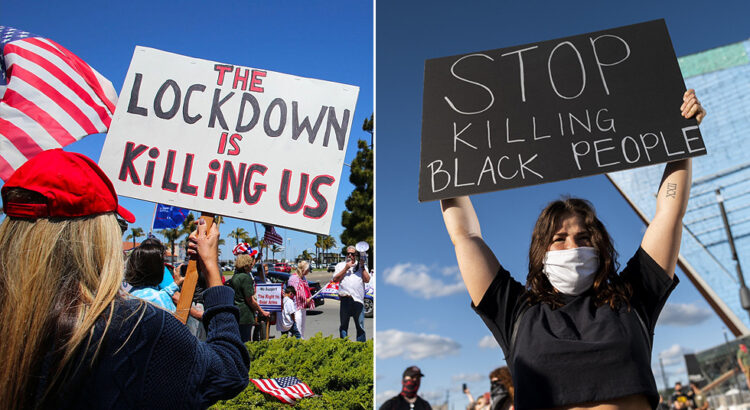By: Slavoj Zizek
Be they against the Covid-19 lockdown or police brutality, the protests gripping the US stem from a ‘money or life’ choice, where people are forced to choose money. The poor are victims, helping to cover up the crime against them.
Our world is gradually drowning in madness: instead of solidarity and coordinated global action against the Covid-19 threat, not only are agricultural disasters proliferating, raising the prospect of massive hunger – locusts are invading areas from Eastern Africa to Pakistan – but political violence is also exploding, often ignored by the media. How little do we read about the military border clashes between India and China, with multiple wounded?
In such a desperate age, one should be excused for escaping from time to time into good old formulaic crime series, like the British-French show ‘Death in Paradise’.
In one of the later episodes, the killer’s motive is the brutal humiliation and torment the victim had subjected him to in high school. Mortally wounded, the victim realizes what suffering he had caused, and uses the last ounce of his strength to alter the scene so that it would seem a third person had perpetrated the murder, in order to exonerate the real killer.
There is something noble in such a gesture, a trace of authentic redemption. But ideology finds a way to pervert even such noble gestures; it can compel the victim, not the criminal, to voluntarily erase any traces of the crime and present it as an act of his or her own free will. Is this not what thousands of ordinary people who demonstrate for an end to the lockdown are doing in the paradise called USA?
‘Money or life’ is not a free choice
Returning too quickly to ‘normality’, as advocated by Trump and his administration, exposes many people to the deadly threat of infection – but they nonetheless demand it, thereby covering up any traces of Trump’s (and the capital’s) crime.
In the early 19th century, many miners in Wales rejected helmets and other expensive protective equipment, even though this gear greatly reduced the possibility of deadly accidents which abounded in coal mines, because the costs were deducted from their salaries.
Today we seem to regress to the same desperate calculation, which is a new inverted version of the old forced choice ‘money or life’ (where, of course, you choose life, even if it is life in misery). If you now choose life against money, you cannot survive, since you lose money and life, so you have to return to work to earn money to survive – but the life you get is curtailed by a threat of infection and death. Trump is not guilty of killing the workers, they made a free choice – but Trump is guilty of offering them a ‘free’ choice in which the only way to survive is to risk death, and he further humiliates them by putting them in a situation whereby they must demonstrate for their ‘right’ to die at their place of work.
One should contrast these protests against the lockdown with the ongoing explosion of rage triggered by another death in the American paradise, the death of George Floyd in Minneapolis. Although the rage of the thousands of black people protesting this act of police violence is not directly linked to the pandemic, it is easy to discern from their background the clear lesson of the Covid-19 death statistics: black and Hispanic people have a much greater chance of dying due to the virus than white Americans. The outbreak has thus brought out the very material consequences of class differences in the US: it’s not just a question of wealth and poverty, it is also quite literally a matter of life and death, both when dealing with police and when dealing with the coronavirus pandemic.
And this brings us back to our starting point from ‘Death in Paradise’, to the noble gesture of the victim helping the perpetrator to erase all trace of his act – an act which was, if not justified, at least understandable as an act of despair. Yes, the black protesters are often violent, but we should show their violence a little bit of the same leniency as the victim does towards his killer in the ‘Death in Paradise’ episode.
Source and Image: https://www.rt.com/op-ed/490252-minnesota-riots-money-life/







 Users Today : 15
Users Today : 15 Total Users : 35460146
Total Users : 35460146 Views Today : 24
Views Today : 24 Total views : 3418807
Total views : 3418807